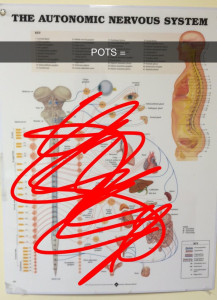
Dysautonomia is the name for disorders describing dysfunctions of the autonomic nervous system (ANS). The ANS controls automatic functions of the body, like heart rate, blood pressure, digestion, temperature control, and more.
So what does Autonomic Dysfunction looks like?
One form of dysautonomia is Postural Orthostatic Tachycardia Syndrome (POTS). (That’s me!!!) From Dysautonomia International, some common symptoms are:
fatigue, headaches, lightheadedness, heart palpitations, exercise intolerance, nausea, diminished concentration, tremulousness (shaking), syncope (fainting), coldness or pain in the extremities, chest pain and shortness of breath. (source)
That’s just the tip of the iceberg. DINET.org also has a list of symptoms experienced by POTS patients. One of the difficult things is how different every POTS patient is. Some are fainters, some have never passed out.
Here’s one of my favorite descriptions of POTS, a quote from Dr. Jeffrey Boris at Children’s Hospital of Philadelphia:
To imagine POTS for yourself: number one, fast for 24 hours; number two, donate a pint of your blood; number three, go home and turn your thermostat up to 100 degrees Fahrenheit; number four, stand motionless. Enjoy the symptoms. (source)
Now, I never did those fun activities before I got my POTS symptoms (they won’t let 10-year-olds donate blood and then subject themselves to this), but it sounds pretty accurate.
Dysautonomia International recently put together an outstanding video explaining POTS featuring world class expert doctors (including mine!) —
*
Some other forms of dysautonomia include:
- Neurocardiogenic Syncope/Vasovagal Syncope
- Pure Autonomic Failure
- Autoimmune Autonomic Ganglionopathy
- Multiple System Atrophy
- Diabetic Autonomic Neuropathy
Learn more at Dysautonomia International.
*
Dysautonomia is not rare. Same goes for POTS. An estimated 70 million people globally suffer from various forms of dysautonomia and anywhere from 1-3 million people suffer from POTS. *They are not rare, just rarely known.*
*
If you are looking for information on dysautonomia/POTS, here are some fabulous resources, articles, and blog posts:
- Dysautonomia International
- Dysautonomia Information Network
- Autonomic Nerve Disorders at Mayo Clinic
- Vanderbilt Autonomic Dysfunction Center
- “Take a Stand” – Neurology Now
*
Disclaimer:
I’m not a doctor, nor do I play one on TV. I will always do my best to provide the most accurate information possible, but doctors, hospitals, and responsible patient advocacy groups ultimately know more than me. (Unless it’s about my own life experience, in which case I’m the expert.)